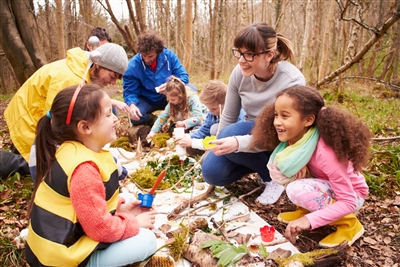The benefits of outdoor learning

We are all so accustomed to the classroom (or rooms in general) being the accepted venue of teaching, it`s easy to overlook how beneficial outdoor learning can be for students. Admittedly the current inclement weather favours indoor lessons, but there are certainly a number of advantages to studying outside.
With the exception of games lessons, pupils spend around five hours a day, five days a week, cooped up inside classrooms. Conducting a lesson outside will prove a wonderful contrast to this confinement, the fresh air and scenes of nature engaging their senses and lifting their spirits!
Just about any class can be taught outdoors, but some subjects will be able to take better advantage the natural surroundings, incorporating them didactically into the lesson. Here are a list of just a few ways the outdoors can offer itself up as the ideal teaching environment.
1. Exploring the plant-life in a field or wood
By studying plants in their natural habitat pupils will have an advantage over indoor learning, soon discovering things that textbook simply cannot provide. They will for example be able to clearly see the distribution of different plants in respect to varying light conditions - for example under the darkened canopy of trees, as opposed to out in an open field. They will also be able to observe the effect of changing moisture levels in the soil, with different species having dominance closer to a stream or lake.
With a net and a jar pupils will be able to collect all manner of pond life, such as tadpoles, water skaters and snails. There maybe be dragonflies hovering around the water, along with common toads, and even newts and field mice. By observing these creatures in their natural environment, the pupils will be far more engaged and interested than merely seeing a diagram in a textbook.
2. Gardening
By teaching a child how to garden they will learn about horticulture, biology, and sustainability. Pupils can keep a record of what they have planted, and can keep track of the progress of their `crops.` This in itself will be a good exercise in record keeping, but they will also learn the responsibility of tending to their plants.
The children won`t just be gaining horticultural knowledge, but will also learn about chemistry and biology as part of their gardening. They could keep a chart that tracks the orientation of leaves throughout the day, and witness how their plants seek to maximise the amount of sunlight they receive, in order to increase photosynthesis levels. Their teacher can also explain what nutrients the plants draw up from the soil, and how different plants thrive in different levels of moisture. The teacher can draw a parallel between this and any plants, such as certain ferns and Lilys observed by the stream or lake, that can tolerate these saturated environments.
3. Outdoor Art
The outdoors are a great place for children to express their artistic side. One of the simplest ways a teacher can conduct art lessons outside the classroom is by tasking pupils to draw chalk artworks on any suitable concrete surfaces. The children will love the freedom granted by the expansive canvases; and by using different coloured chalk, they will be able to give free rein to their imaginations!
As their creations will only be temporary, soon washed away by the first heavy rainfall, their teacher could endeavour photograph each pupils` finished piece, presenting them with a printout of their work when they return to the classroom.
Many studies attest to the benefits of outdoor study, with increased concentration, imagination and creativity being commonly cited as some of the advantages. Decreased stress levels are something else to be gained from leaving the classroom, with the fresh air and sounds of nature thought to boost the level of serotonin in the brain.
Of course outdoor lessons will require a particular form of planning, and teachers will have to ensure they are prepared for the particular challenges that come with abandoning the cloistered security of the classroom; but there is certainly much to be gained from conducting some lessons outdoors - weather permitting!

 Add a Comment
Add a Comment